Building a Desert Based Economy Daweb | Hardap Region | Namibia
RuralRevive – Building a Desert Based Economy, is a project conceptualized under ‘The AridEden Project Wolwedans Vision 2030’ – a framework which encapsulates Wolwedans' sustainability journey ahead. Underpinned by a philosophy of balancing people, planet and profit, it aims at building resilient and thus more sustainable, inclusive and equitable tourism and conservation economies.
Sustainability at Wolwedans and hence RuralRevive too, is based on five core pillars: Commerce | Community| Conservation | Consciousness | Culture. These 5C’s guide us in all we do.
The RuralRevive Initiative seeks to address five pressing global challenges:
• Climate Change
• Wealth Inequality
• Food (In)Security
• Plastic and Waste
• Rural Youth Exodus
…through a number of projects and interventions covering nine fields or ‘spheres’:
• Enterprise Development – ‘building a desertbased economy’ - the driving force of RR
Since 2021 RuralRevive has made significant progress in achieving its first project milestones and establishing the foundation for a holistic economic concept that will benefit local communities in the Daweb Constituency. The primary goal of RuralRevive is to revitalize Maltahöhe and its people through a diversified local economy, creating sustainable entrepreneurial and employment opportunities while addressing supply chain gaps and supporting underprivileged individuals in the area.
• Horticulture & Food Security
• Transport & Logistics
• Waste Management & Recycling
• Resources (Energy & Water)
• Education & Skills Development
• Community Well-being & Nutrition
• Culture & Heritage
• Media Ecology & Advocacy
IN IT FOR THE LONG RUN
The Republic of Namibia is ranked 2nd in the world when it comes to income inequality between rich and poor. This is perhaps most evident in rural areas of the country, particularly in the Maltahöhe district. It is a region which has been in economic decline for decades. Increasing droughts as a result of climate change and the collapse of Karakul sheep farming as an economic pillar have exacerbated the socio-economic challenges faced by the community, resulting in considerable social upheaval among the local population, including rural exodus and alcohol abuse as consequences of hopelessness. The longer-term implications have seen the erosion of the community’s social fabric and disappearance of local knowledge and traditions.
Within this context, the number of tourism products operating in the region of the iconic Namib Desert has grown considerably over the past few years. Their supply chains for goods and services extend all the way to Namibia’s capital, Windhoek, which is 350km away with these supply routes passing through Maltahöhe. Therefore, the village is strategically located as a potential distribution hub and shipment point for
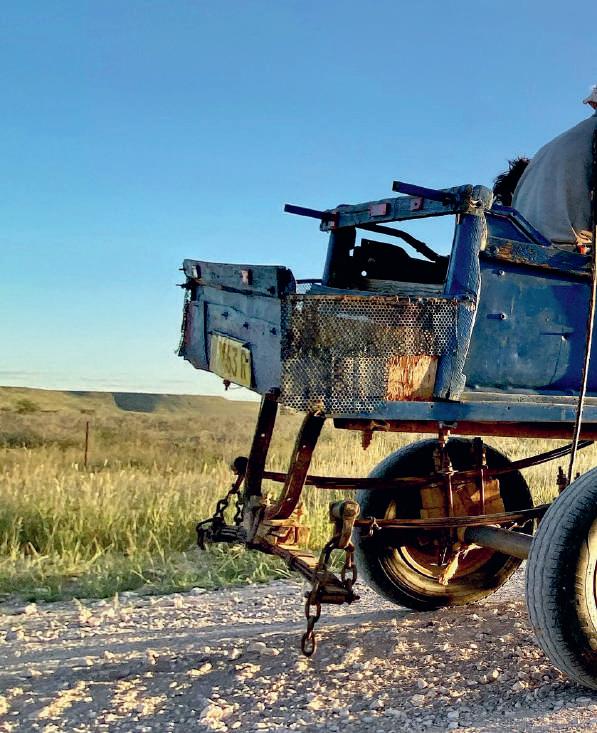
products and services, especially those that are locally produced as they offer a competitive advantage due to much lower transportation costs.
In recognition of the win-win opportunities presented by this scenario, Wolwedans has chosen to be part of the solution whereby the two ends of tourism needs and
This mission is no quick fix and a long journey lies ahead.

local opportunity must be connected, acknowledging that investing in capacity building, skills training and human development is key. Combining the insights and experiences of key stakeholders from the Maltahöhe area will result in the co-creation of opportunities built on economic development and empowerment activities.
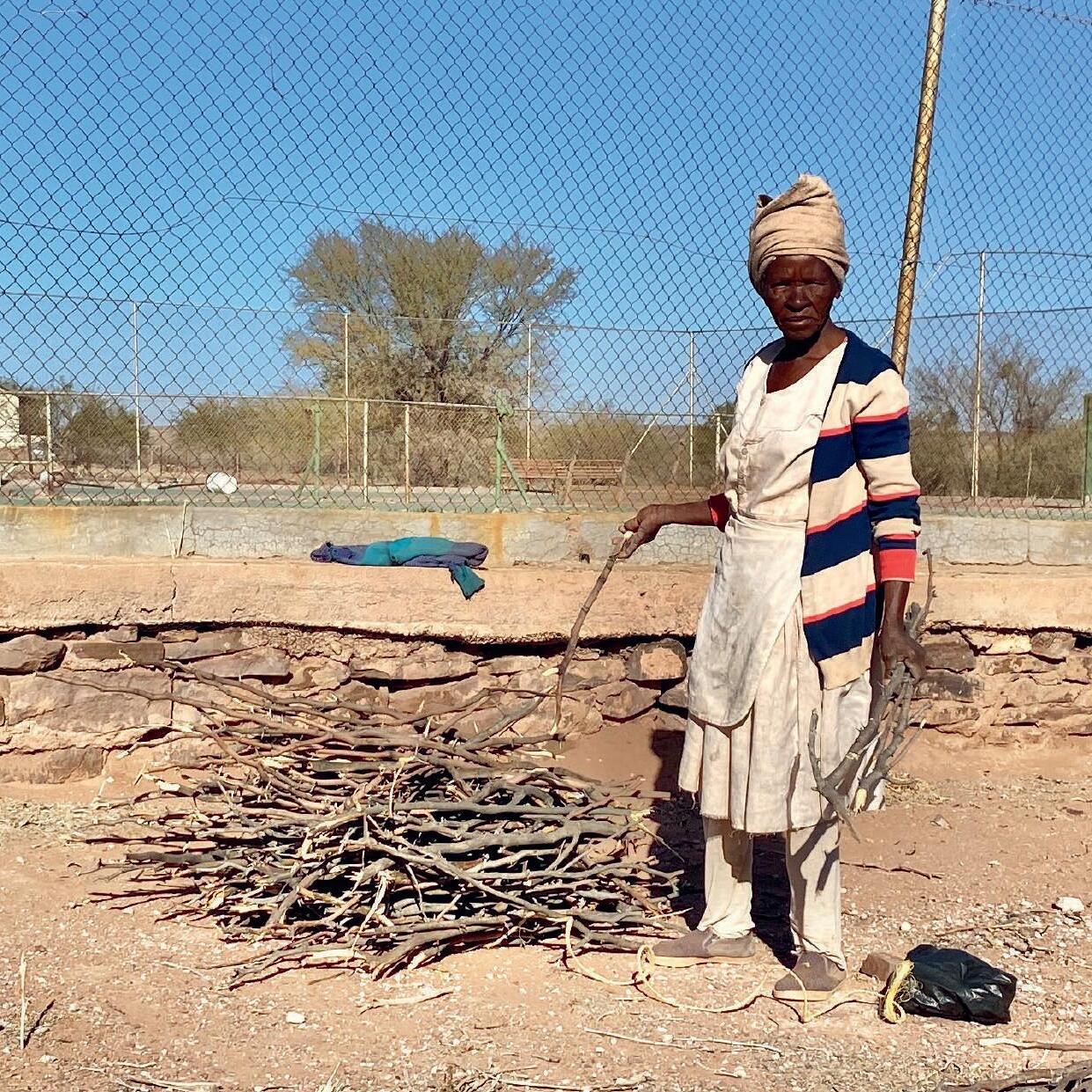
A morning’s worth of work. An impoverished resident of Maltahöhe Village collects dry sticks for cooking or selling to make an income. The abandoned tennis courts in the background are testament to what once must have been a vibrant and thriving community.
Apart from climate change, wealth inequality is one of the most pressing challenges of our times. While structural solutions are mostly in the hands of regulators and public authorities - multi-stakeholders’ initiatives, networks and projects that facilitate exchange and social mobility have a key role to play. Only a systemic approach can bring results and drive change.
The RuralRevive Initiative - an open system providing a platform and framework for multiple stakeholder involvement – adresses these challenges through a range of initiatives and interventions, as well as through a number of envisaged public-private-partnerships.
Maltahöhe is a small village in the Hardap Region of Southern Namibia, located about 350km away from Windhoek, and about 110 km west of Mariental. The village is home to some 6000 inhabitants, who are mainly remnants of communal and commercial farmers of small livestock, and a few horticulture allotments. The area is a former economic hub, a result of the karakul sheep industry which dwindled over the years. Today, there are only a handful of retail outlets left. On the side-lines, are often scenes of young men and women desperately looking for job opportunities. In addition, an ever increasing number of street children beg for some money from tourists.
Contrary to the current socio-economic status, Maltahöhe offers an array of opportunities which could potentially be used to uplift the marginalized community. The village is currently used as a pathway to tourism destinations such as Sossusvlei , NamibRand Nature Reserve and ProNamib Nature Reserve –strategically making it a potential distribution hub and shipment point for products and services. Additional advantages for the regional tourism industry include financial savings and reduced carbon footprints as a result of shorter delivery routes.
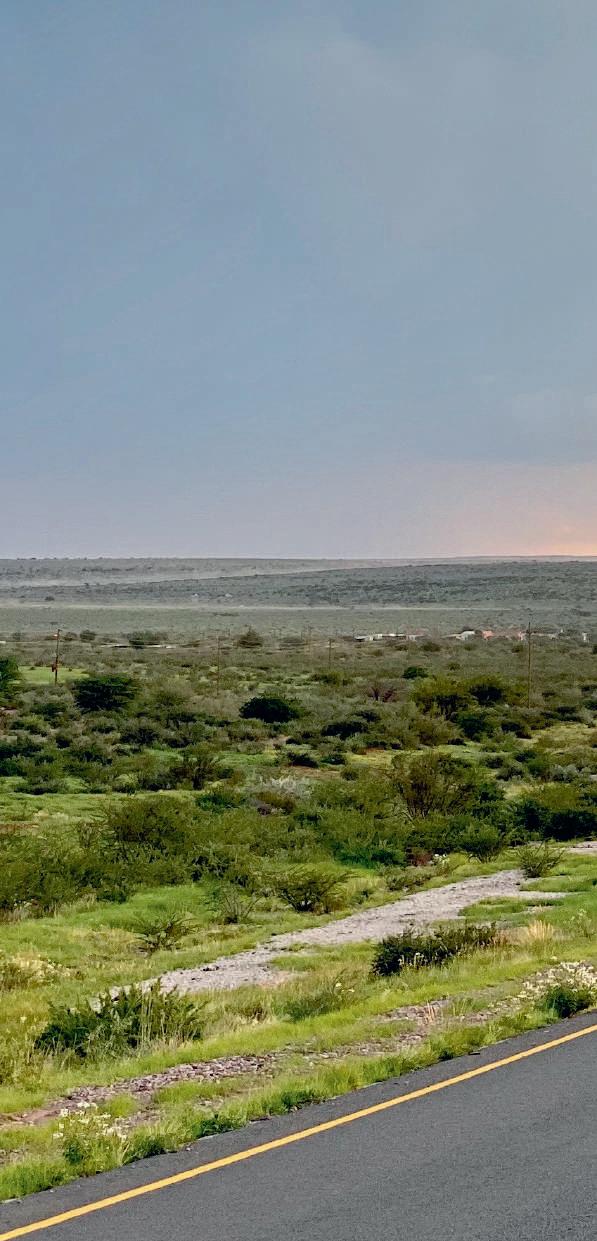
Maltahöhe: Where the tar road and the gravel road
road ends road begins
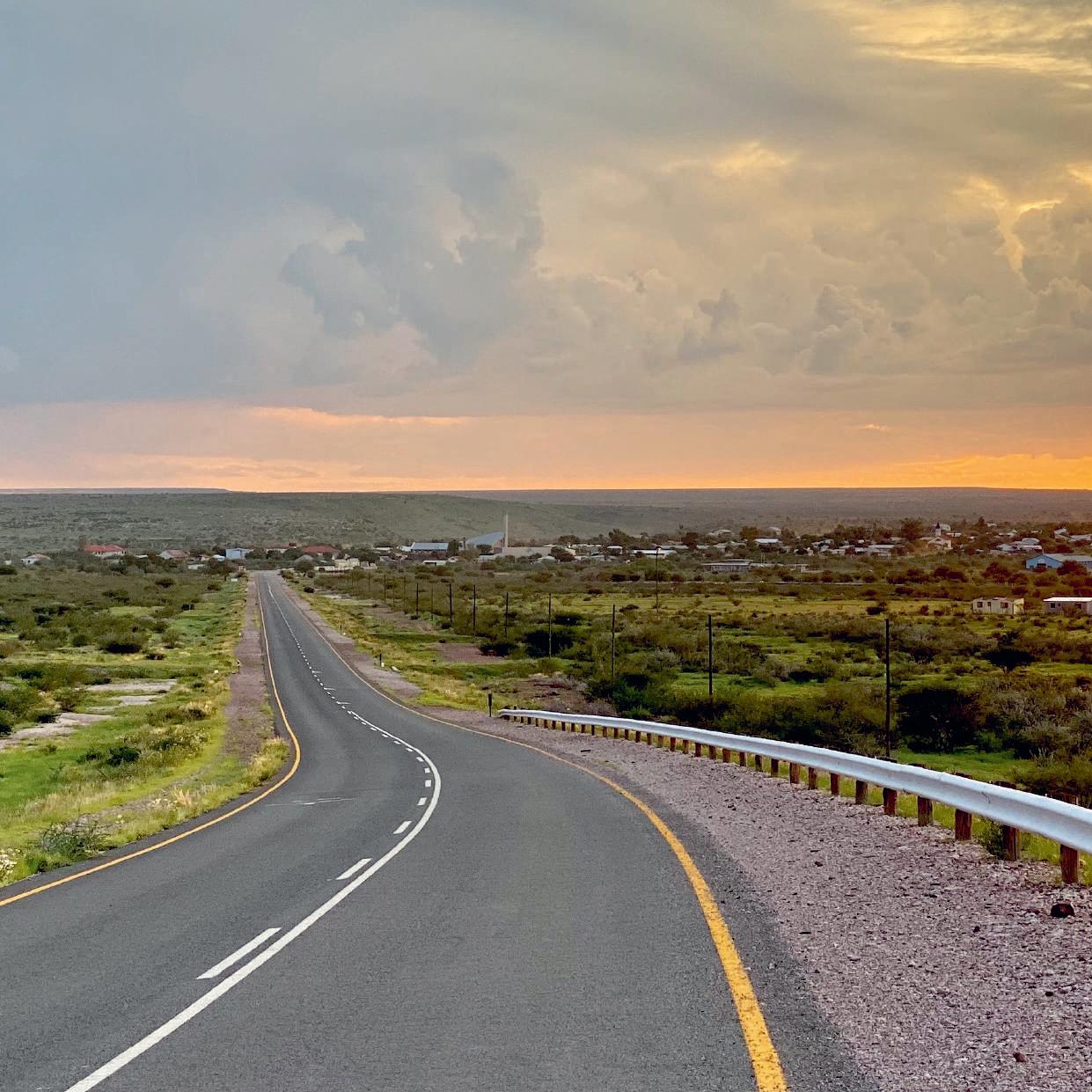
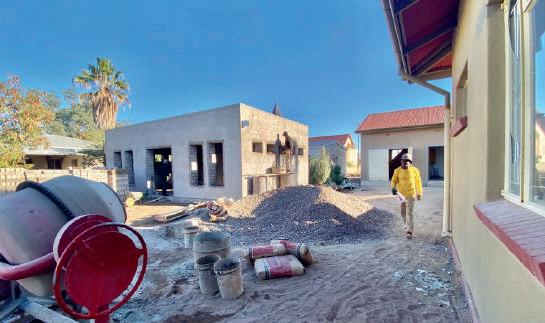
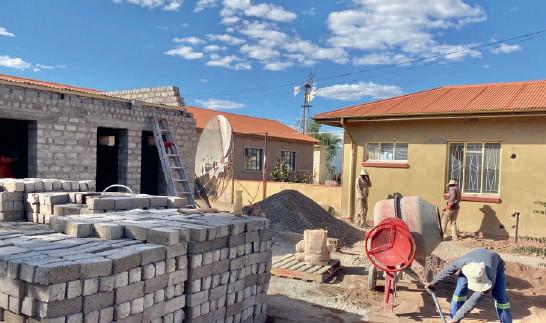

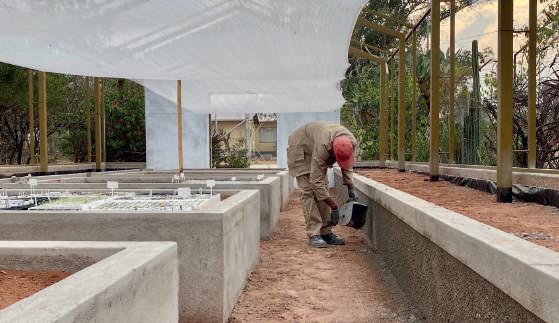
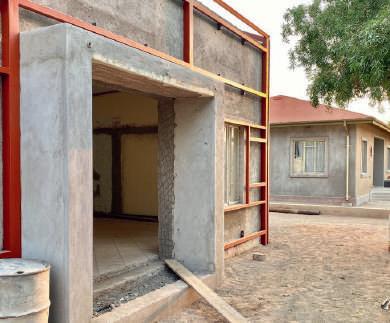
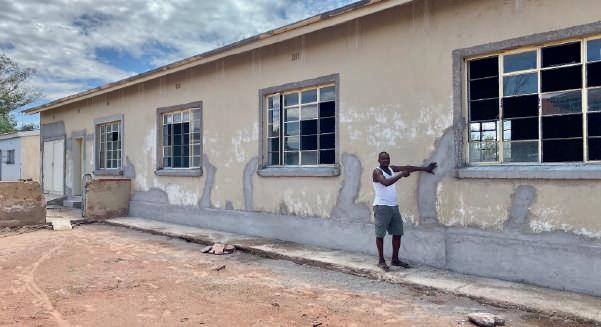

Beginnings
Four adjoining properties were purchased by the Wolwedans Foundation over the last years and form the core of the project. Renovations, alterations and additions to meet the first three building blocks (Laundry | Horticulture | The Barn – Trading Hub ) commenced in January 2021 and Phase 1 will be completed mid-2024. This will also be the future Horticulture Campus with training and dorm facilities. As the project grows in scope, more properties will be added and see a transformation from delipidated old infrastructures to beautifully renovated buildings, adding charm.
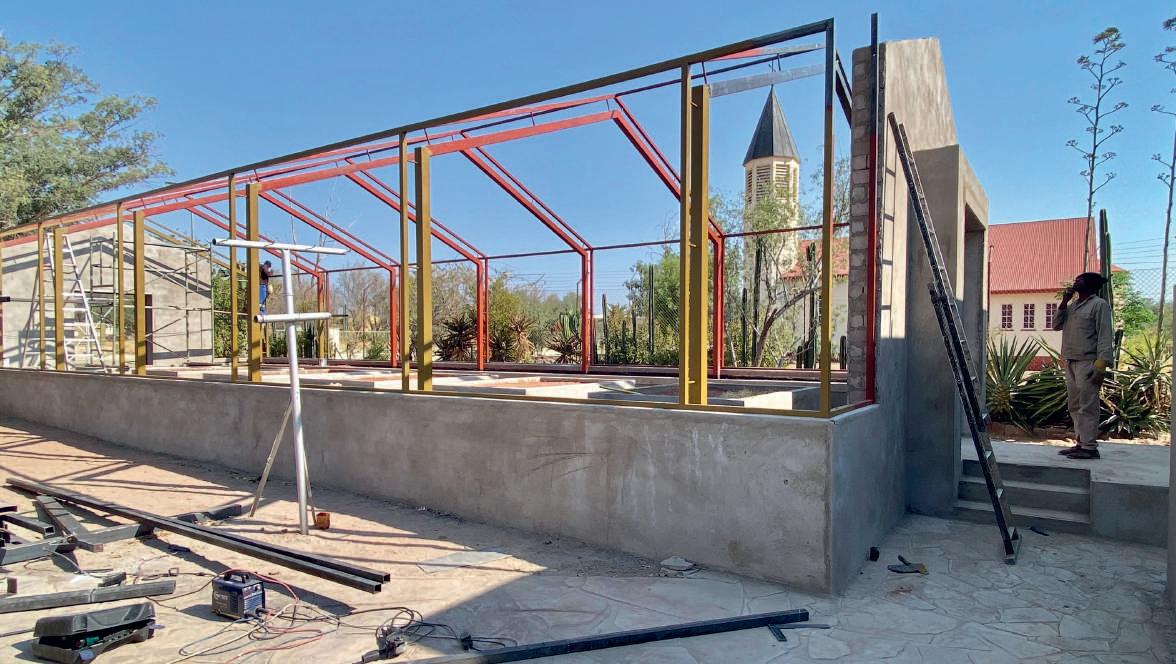
THE LAUNDRY
The first enterprise activity within the RuralRevive framework entails the setting up of a large-scale laundry operation in Maltahöhe, aiming to cater for the wider tourism sector in the Daweb Constituency, especially the desert-based lodges. Laundries consume between 25-33% of fresh water at any lodging establishment, and with most lodges becoming increasingly conscious about the lowering water tables, a laundry service should naturally attract attention and support.
Once the DesertRunner transport solution is in place, providing regular transport between Maltahöhe and the lodges in the desert, the laundry should see a surge in activity.
The state-of-the-art laundry facility incorporates a 50kW solar installation ensuring energy independence, and a waste-water recycling plant will enhance sustainable operations in the arid environment. As part of our commitment to local empowerment and job creation, the laundry facility will ultimately create eight full-time jobs and many freelance positions.
To date, six ladies have received training in eco-friendly laundry practices, equipping them with new skills.
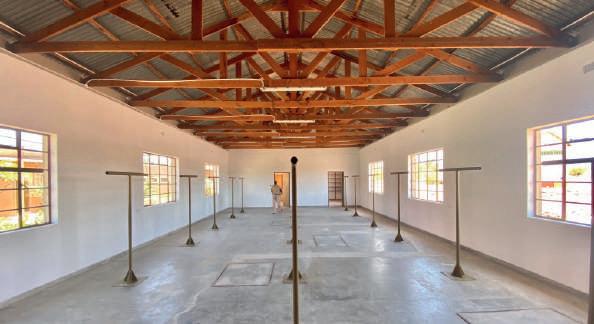
 Left top: The drying shed ready to receive linen, mainly comprising bulky bedding and towels.
Above: the ironing room has twelve workstations.
Left top: The drying shed ready to receive linen, mainly comprising bulky bedding and towels.
Above: the ironing room has twelve workstations.
WHERE THE WHEELS START TO MOVE
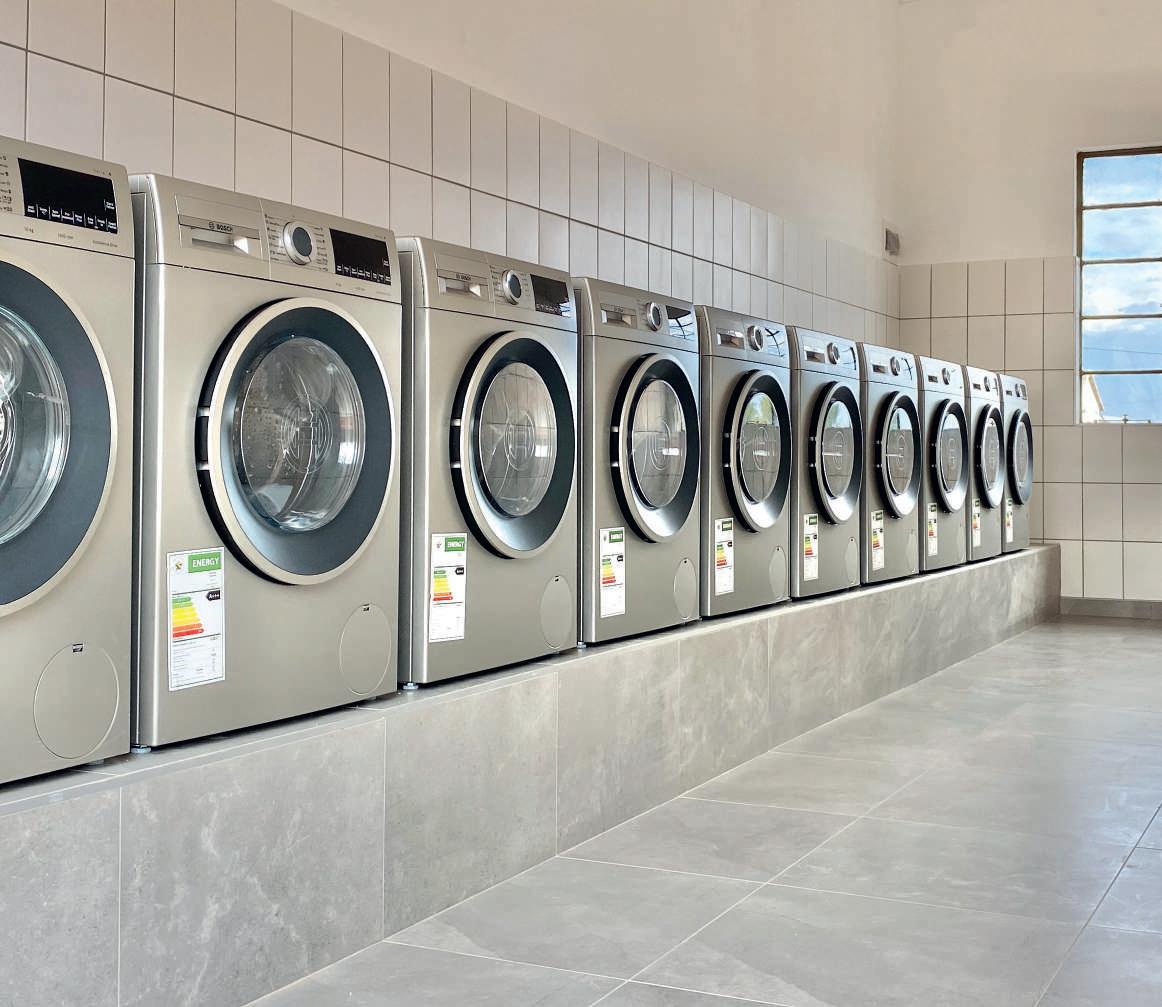
The Village Laundry comprises of a receiving bay, washing room, drying shed (to keep laundry out of the scorching sun), an ironing room with 12 ironing boards and a big laundry store which is still to be built.
WATER TREATMENT PLANT
Maltahöhe presents a unique situation. The entire village is built on solid rock (see right), resulting in the absence of a sewerage system. Consequently, each property is equipped with a drain/pit that requires periodic pumping when full. However, this process is occasionally hindered by breakdowns in the pump truck, leading to sewage overflow and water wastage in the streets.
This presented a significant challenge for the laundry facility, which consumes a substantial amount of water and would fill up the pit daily. The solution was to implement a water recycling system that could process all laundry water to a level suitable for reuse in vegetable and fruit farming. As a result, the laundry now operates a cutting-edge water recycling plant, allowing for the sustainable reuse of 90% of the consumed water. As for black water from toilets and kitchen sinks, it is managed using the traditional Maltahöhe ‘method’. This involves transporting and pumping it into a settling reservoir located outside the town. This process holds great potential for reuse, particularly in enhancing the greenery of the village, including trees, shrubs, and lawns. Currently, this valuable resource is simply evaporating into the arid Namibian atmosphere.
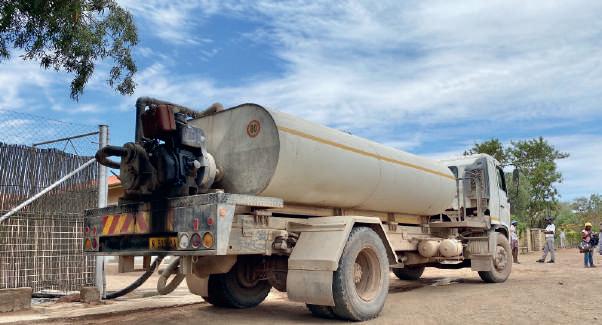
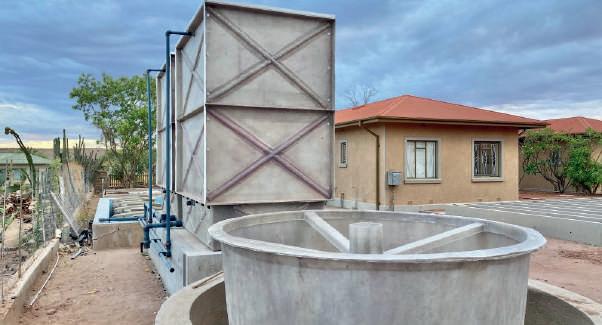
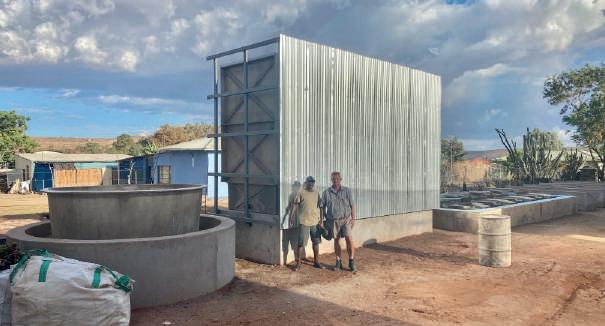
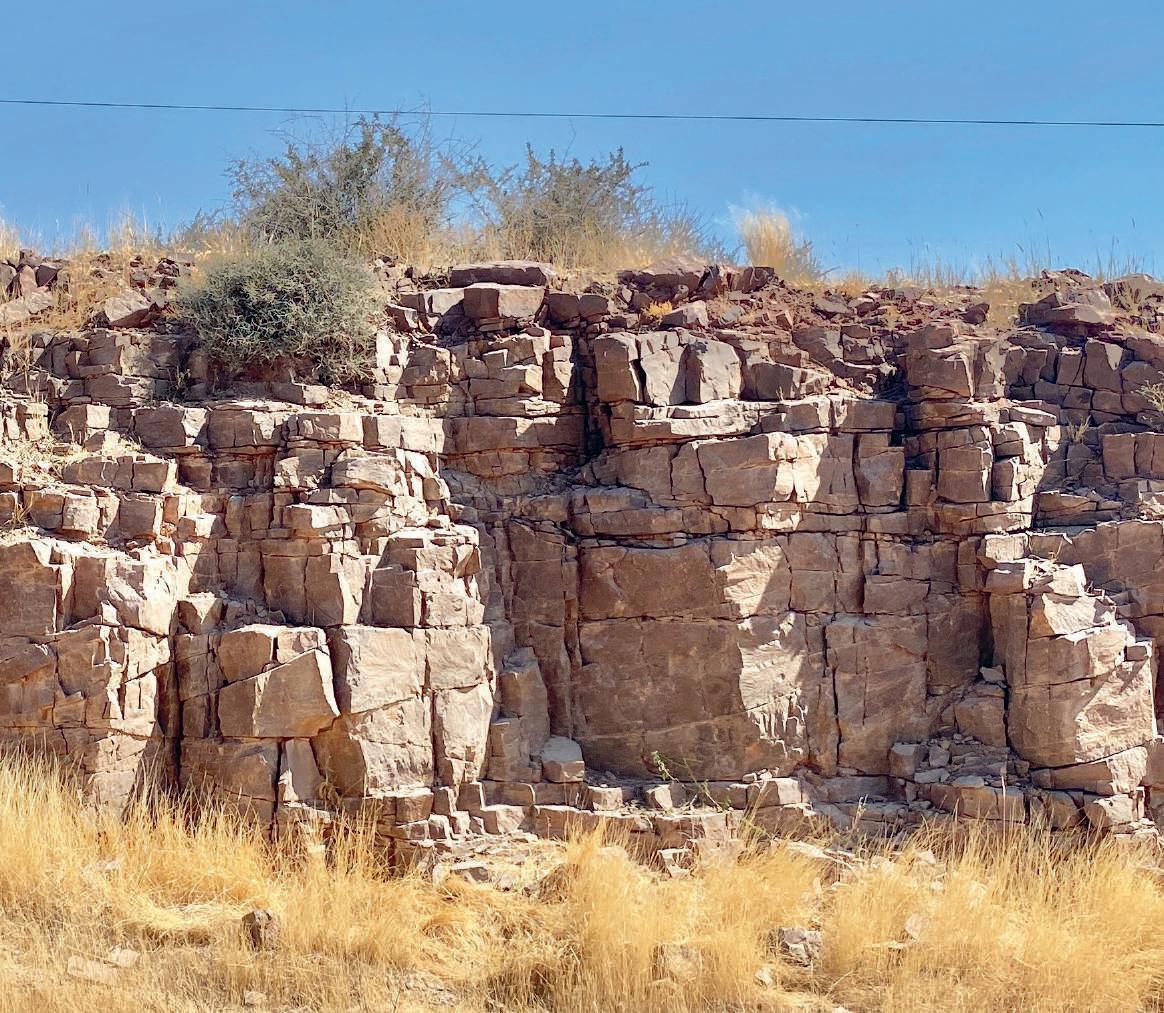
Topography of Maltahöhe. Minimal top soil which poses a challenge for horticulture. This inhospitable earth – at face value – will not deter RuralRevive from growing food.
HORTICULTURE
RuralRevive is actively establishing greenhouses and irrigation systems in Maltahöhe and surrounding areas to produce organic staple vegetables for the local market and tourism industry. As part of the commitment to community development, a survey was conducted and it identified challenges such as limited water access, extreme weather conditions, lack of skills, and financial constraints.
In response to the community’s desire for an open farmers market and vocational education for youth, RuralRevive has set up a demonstration training site featuring main greenhouses, organic materials collection, and a permaculture garden.
A training session was conducted in partnership with GIZFarming for Resilience (F4R) and schools will be engaged to incorporate horticulture into the curriculum. Additionally, the project organized an intensive horticulture training program (The Organic Gardening Christmas Training), fostering self-sufficiency, enhancing food security, and creating entrepreneurial opportunities. As a testament to the success of the program, three trainees have secured full employment. At Wolwedans, RuralRevive Campus, and GIZ’s Farming for Resilience Programme.
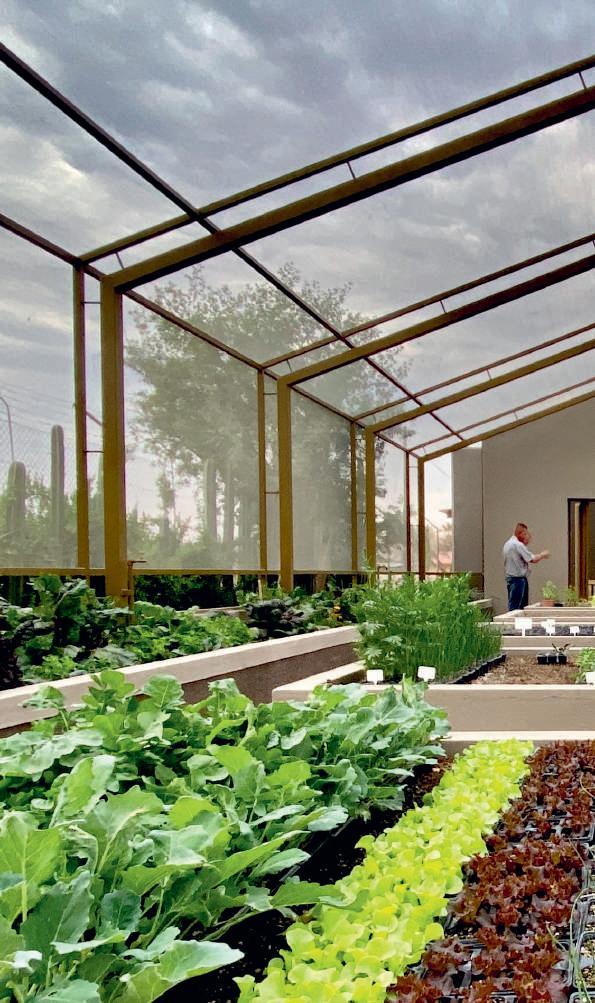
This is the Seedling Nursery where vegetable production extent to avoid shortages or surpluses.
production and hence supply is controlled to an
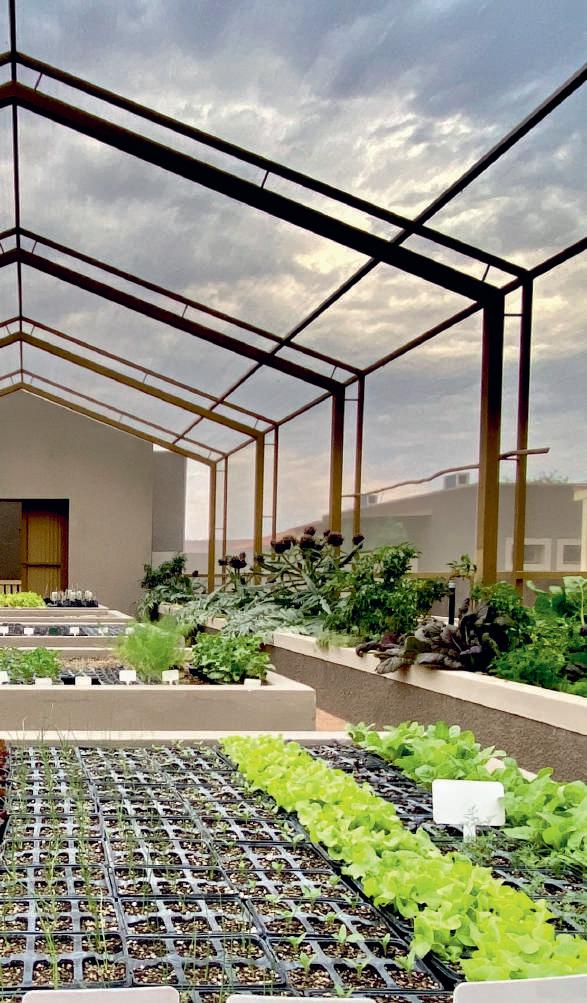
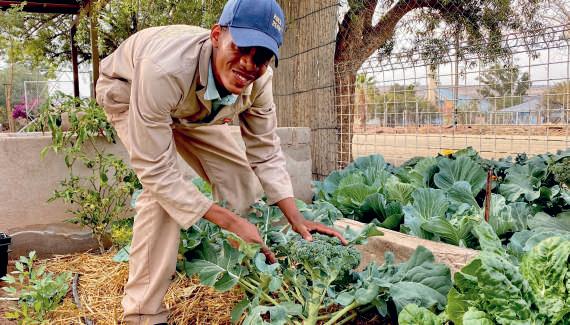
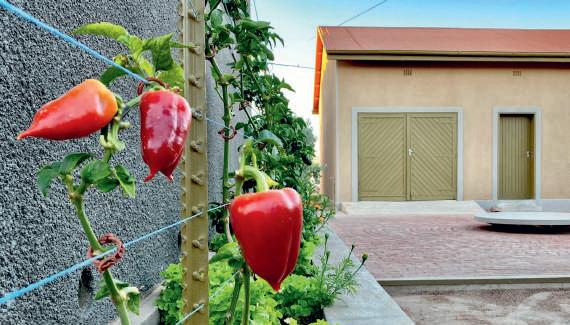
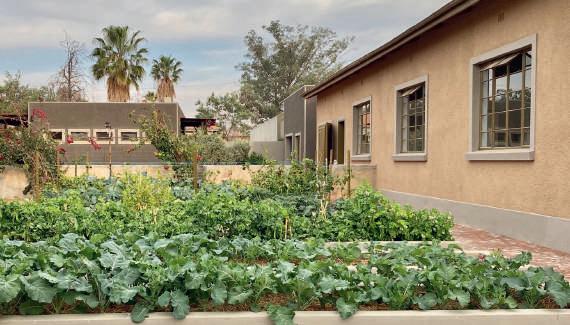
THE BARN – CENTRAL TRADING HUB
Commerce and enterprise development is at the heart of RuralRevive
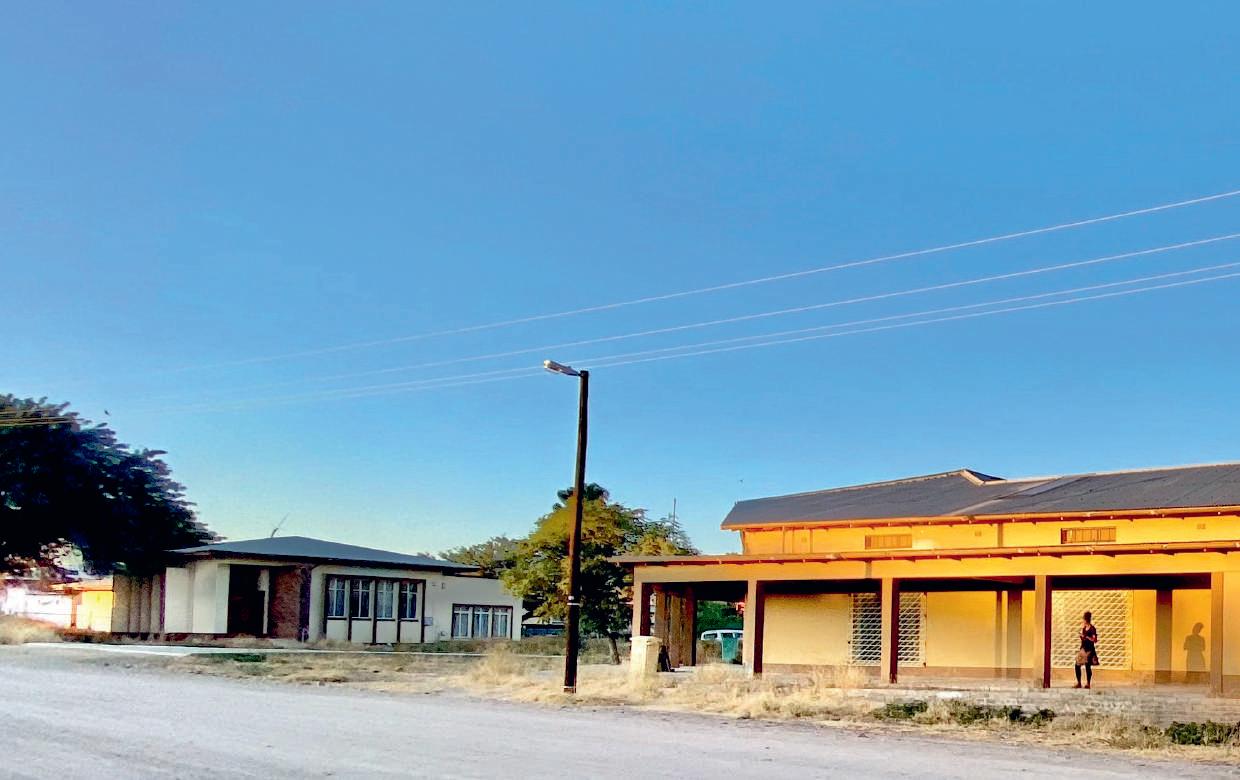
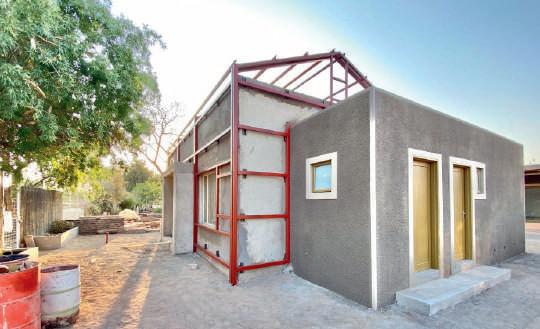
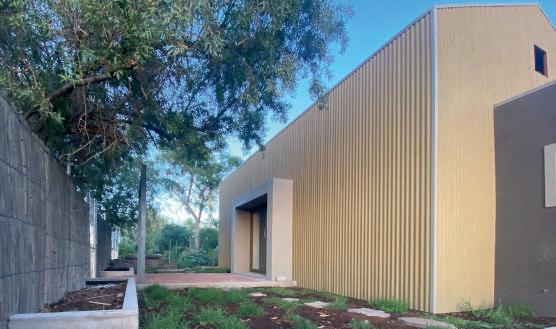
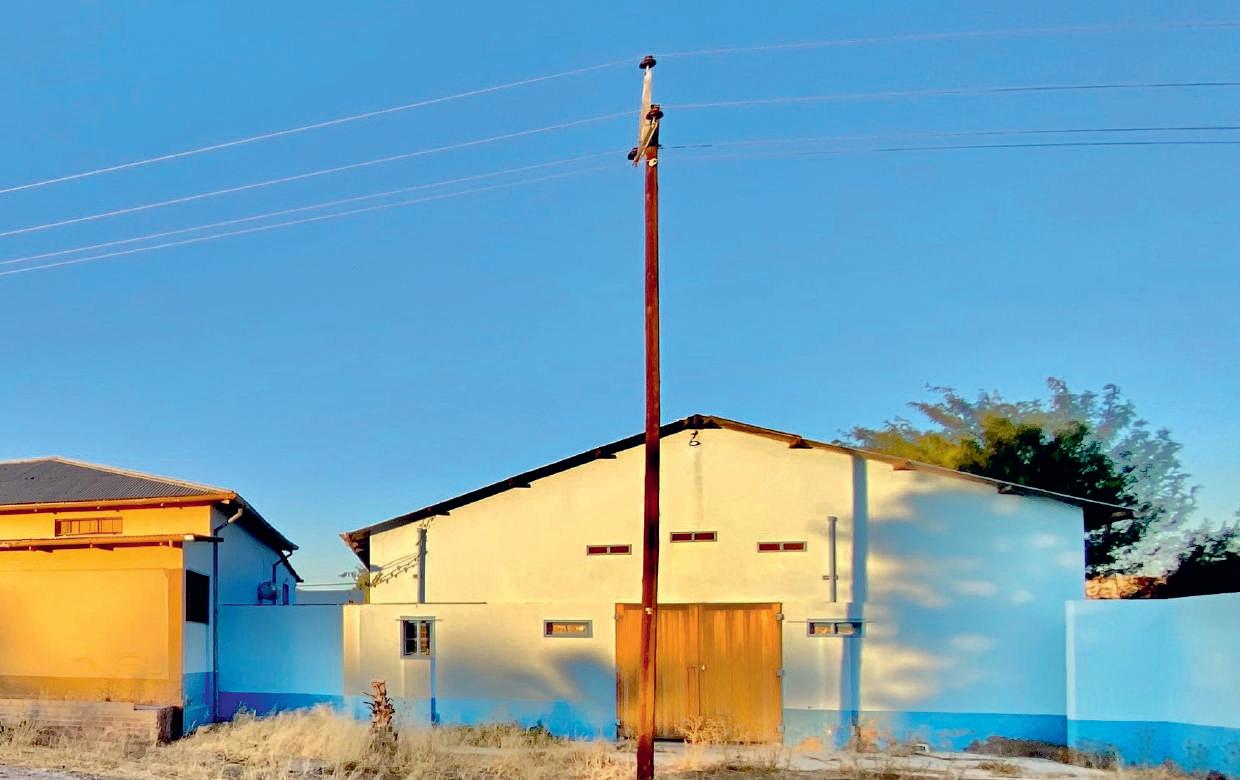
The Barn in Maltahöhe will serve as a distribution hub for local farmers and small producers, offering a range of fresh produce such as fruit, vegetables, processed meat products, eggs, and cheese. RuralRevive is organizing regular open markets connecting local producers with consumers, thus laying the groundwork for establishing a robust supply chain for The Barn and a lively trading hub.
To start, a former fashion shop on the project premises will serve as ‘The Barn’ (see bottom left). It is anticipated that it will be outgrown in no time, so the Wolwedans Foundation acquired the old PEP Store building down the road which will be perfectly suited to house a range of RuralRevive related initiatives, including a coffee shop and an arts and craft center.
These open markets will one day run on a weekly basis. They will not only support local businesses and artisans, and showcase the vibrant culture of Maltahöhe, but also highlight the importance of supporting local farmers and fostering community bonds. Looking ahead, there are plans to explore the possibility of establishing a coffee shop at The Barn, creating a central meeting space for producers and tourists, and to foster networking.
Composting & Soil The foundation of Horticulture
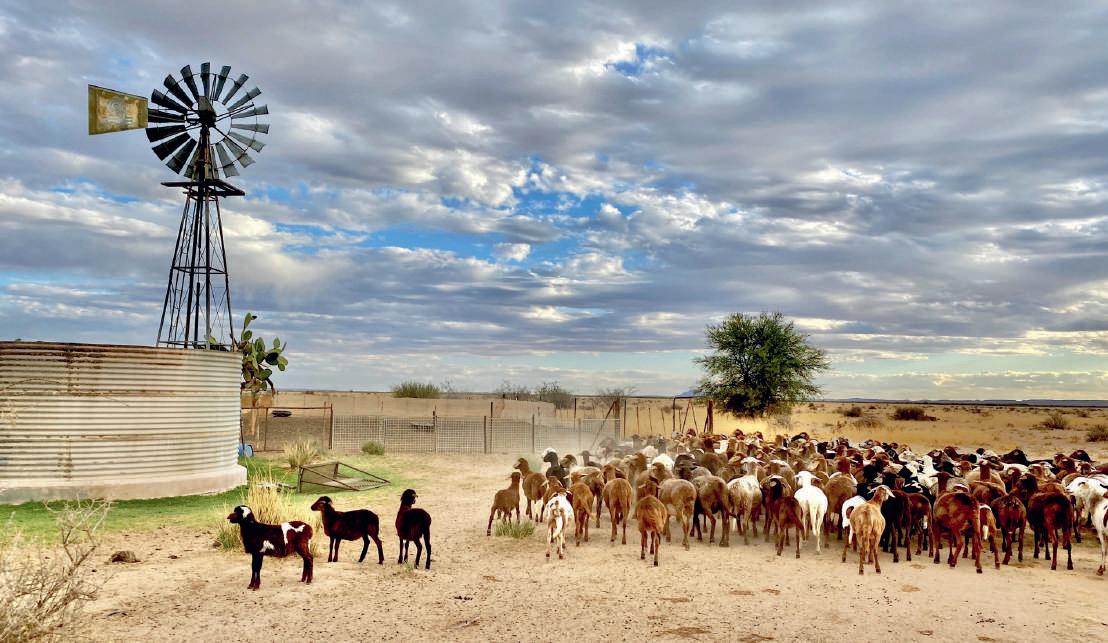
In Maltahöhe, suitable soil is scarce due to the town being built on solid rock. This necessitates the use of elevated planter boxes for all gardening activities at the RuralRevive premises and beyond. These boxes will require a filling of high-quality soil, which serves as the foundation for successful horticulture. Hence the ongoing challenge lies in producing sufficient compost from biomass.
The latter (biomass) will primarily consist of chipped Prosopis, hay (sourced from Mariental) and sugar cane, along with readily available sheep dung from numerous sheep kraals in the vicinity.
The process of composting can take place at any of the existing sheep kraals, of which there are thousands in the area. Bulk compost is created through a thorough mixing process and the results are nothing but astounding.
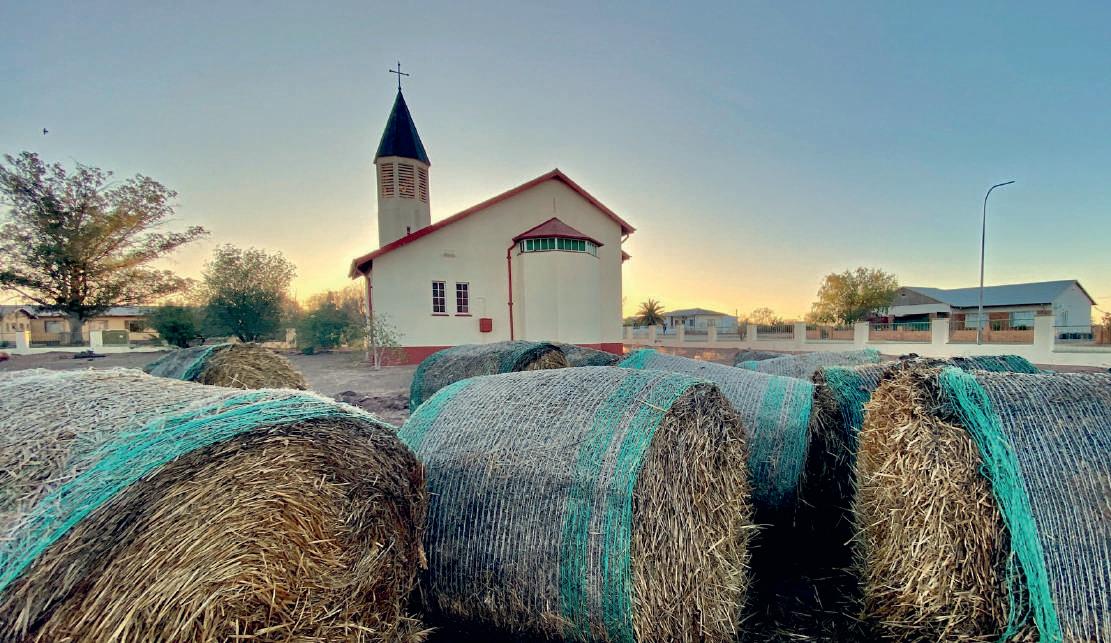
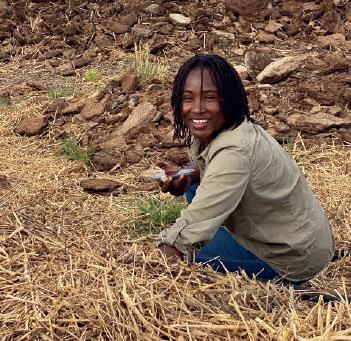
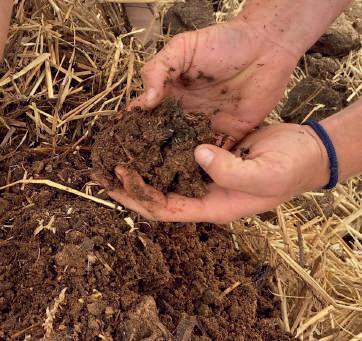
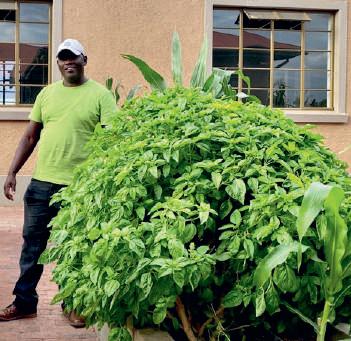
BASIL
DesertRunner
TRANSPORT SERVICE
Connecting the dots
A scheduled transport service to the tourism enterprises in the greater Sossusvlei and NamibRand regions plays a crucial role in the success of RuralRevive. DesertRunner, a scheduled transport solution, will ensure the reliable delivery and collection of laundry, fresh produce, people and recyclable waste, effectively connecting all the necessary dots.
To ensure cost-effectiveness and maximize participation, the transport service operates under the RuralRevive Project umbrella as a non-profit service.
The development of routes and the inclusion of a maximum number of tourism establishments in the Greater-Sossusvlei Namib Landscape (GSNL) further solidifies the implementation.
RuralRevive emphasizes the importance of providing good value for money, as this will be the primary motivator to bring stakeholders on board. To ensure the success of RuralRevive it is essential that the initiative is an economic win/win.
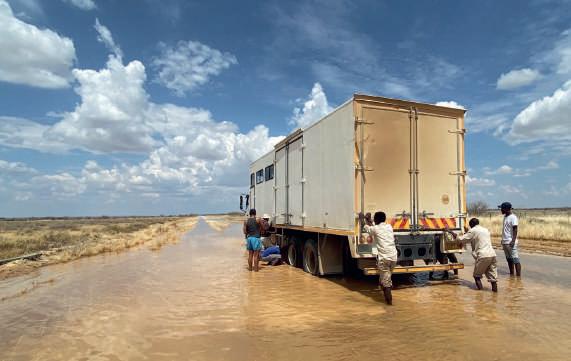
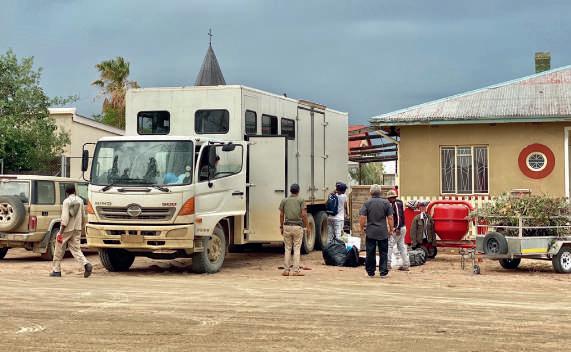
Passenger transport will be a driving force of the DesertRunner. The future also foresees a daily bus service linking Maltahöhe with Mariental and Windhoek, taking the route much further than Maltahöhe. Lodge staff heading on to Mariental and beyond will need sleep-over options in Maltahöhe.

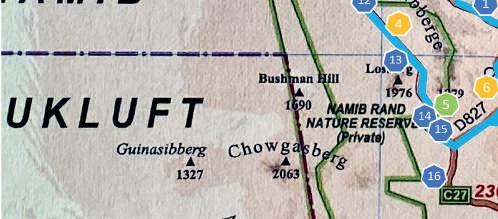
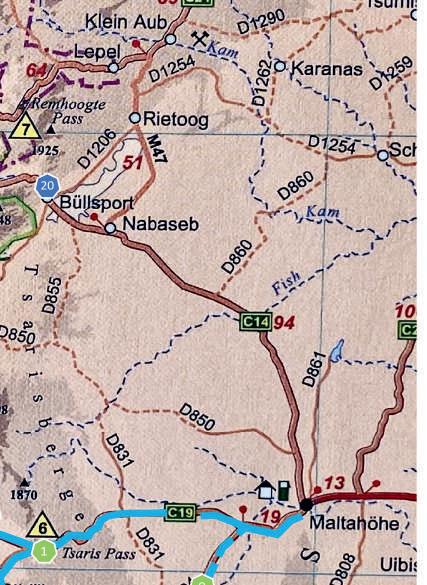

This will naturally lead to a thriving board and lodging sector, ranging from basic dorms to B&B’s and more sophisticated accommodations. It will also lead to more eateries and entertainment joints (think revival of public pool), and all these independent small enterprises will naturally create new jobs.
0 Lodges & Tourism 1 - Wikebi 2 - Hammerstein 3 - Ultimate 4 - Litte Sossus 5 -Desert Homestead 6 -Ondili Lodges (2) 7 - Hoodia 8 -Sesriem (5 lodges) 9 -Geluk (3 lodges) 10 - Mirage 11 -& Beyond SDL 12- KwessieDunes 13 -Wolwedans 14 -NaDeet 15 -Tokokkie & Hideout 16 -Aandster/Toulouse 17 - Duwisib 18 & 19 -open/future 20 - Bullspoort 21 - Ababis 22 - Solitaire 23 -Namib-Naukluft 24 -Moon Mountain 25 -Namib Desert Gondwana 26 - Weltevrede 27 - Elegant Homestead 28 -other 8- Ranger Stations & Farms 1-Zaris 2-Neuhof 3 -La Motte 4 - Keerweder (NamibRand) 5 -Wereledend 6 -Nubib (ProNamib) 7 - Eldorado
RECYCLING & SOLID WASTE
To achieve a significant reduction in landfill and landscape pollution in Maltahöhe and the surrounding region, RuralRevive promotes an integrated and collective approach to waste management, considering waste as a valuable resource.
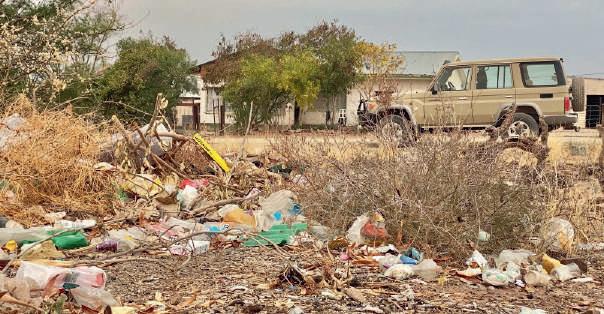
The project has initiated the process of setting up a community-driven waste management system through engagements with Rent-A-Drum. This initiative aims to promote environmental sustainability by implementing the “Trash-to-Treasure” concept, which supports reusing and repurposing waste while providing market access platforms for these products. By creating livelihood opportunities and actively keeping waste out of the waste stream, RuralRevive ensures a cleaner and healthier living environment in Maltahöhe and the Daweb Constituency.
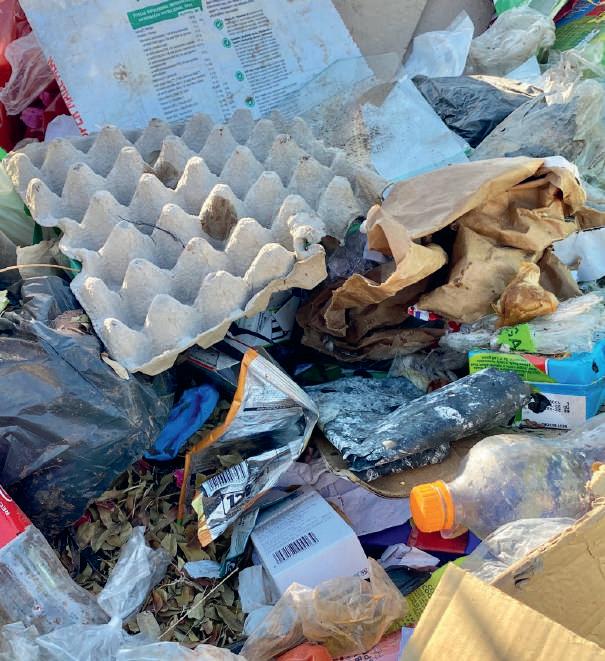 Left top: Lots of trash. A common sight in Maltahöhe
Bottom: This resource is just dumped in the landfil area
Right: Assessing the dump site and looking for solutions to a major rural and global challenge
Left top: Lots of trash. A common sight in Maltahöhe
Bottom: This resource is just dumped in the landfil area
Right: Assessing the dump site and looking for solutions to a major rural and global challenge
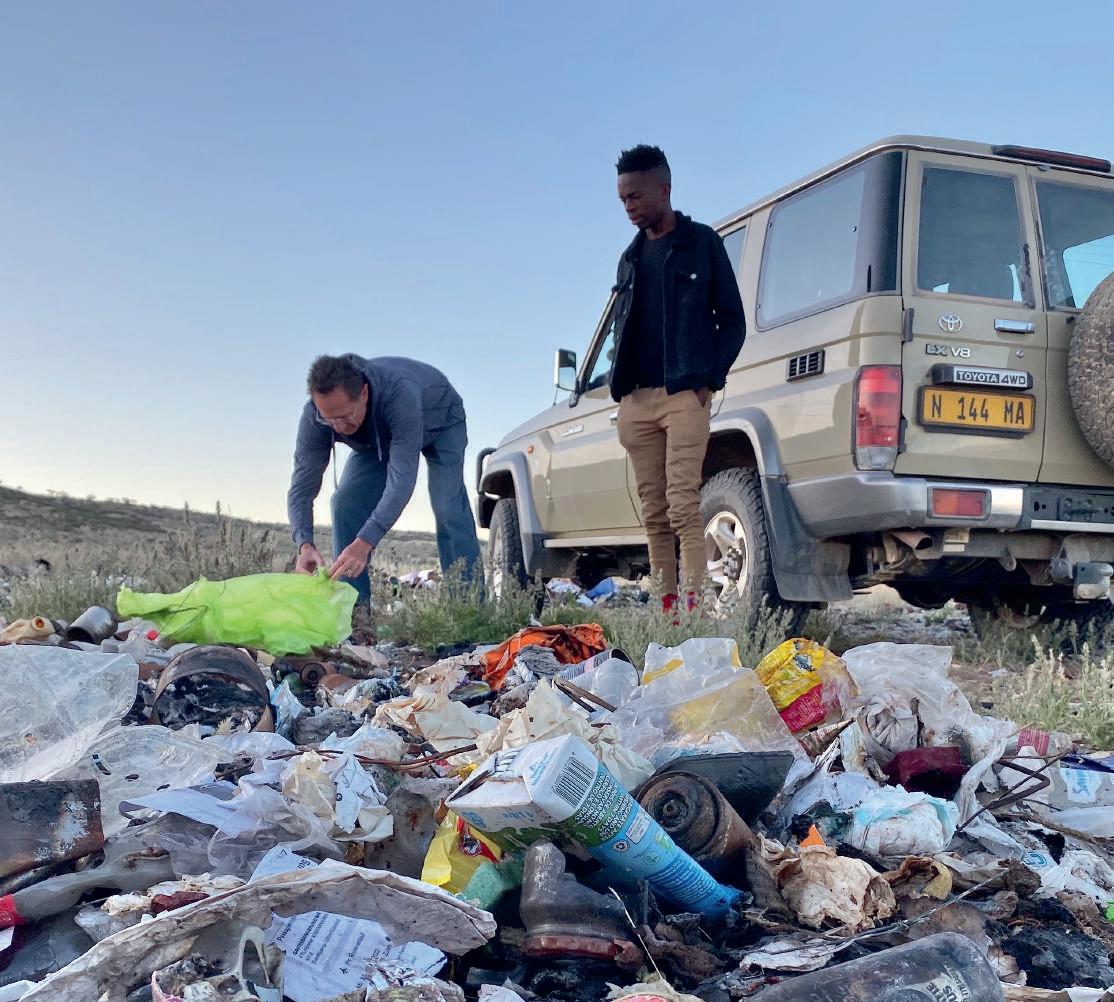
What a mess!
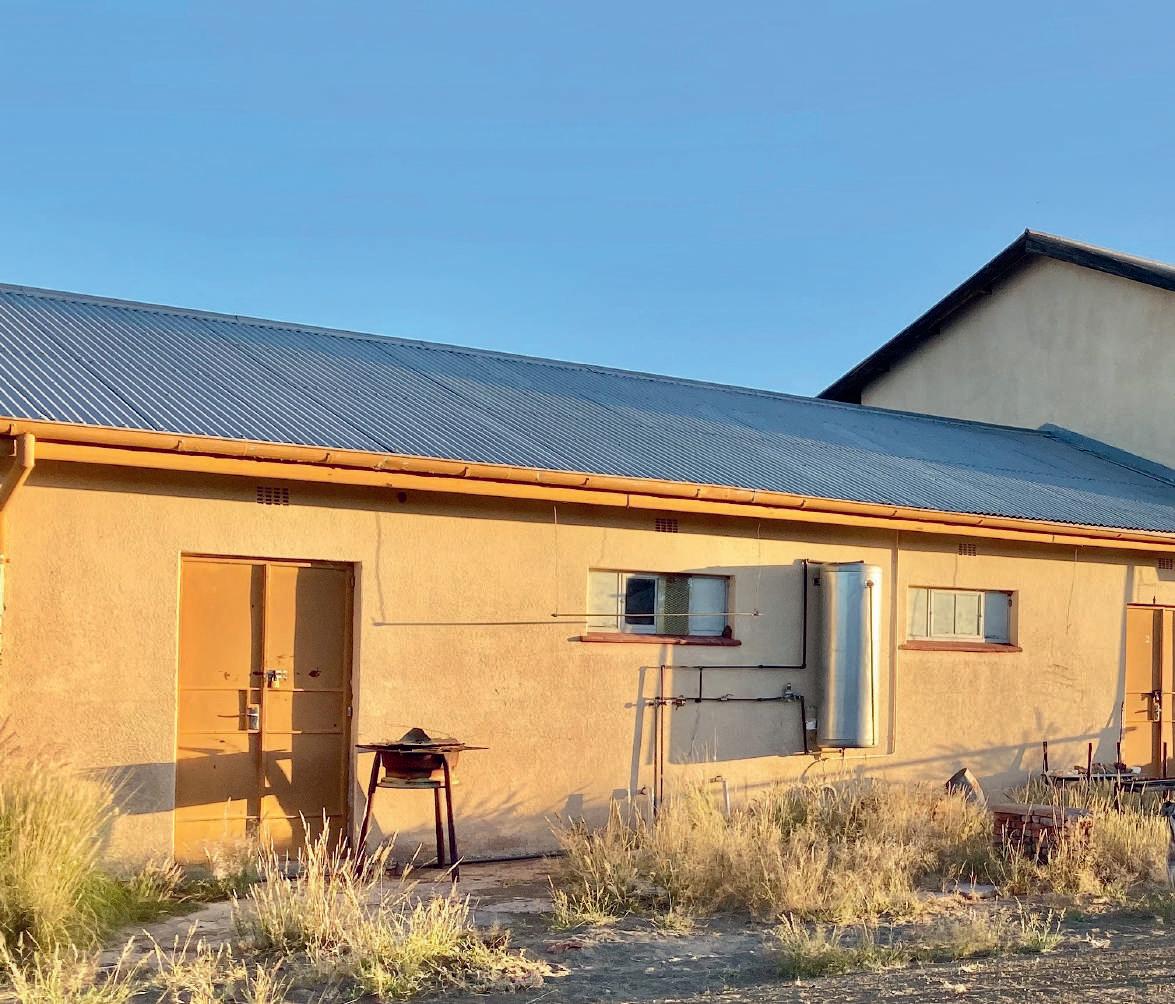
Future Recycling Facility?
The dormant RCC Property would be the perfect infrastructure.
Negotiations to rent this ‘gem’ are at an advanced stage.
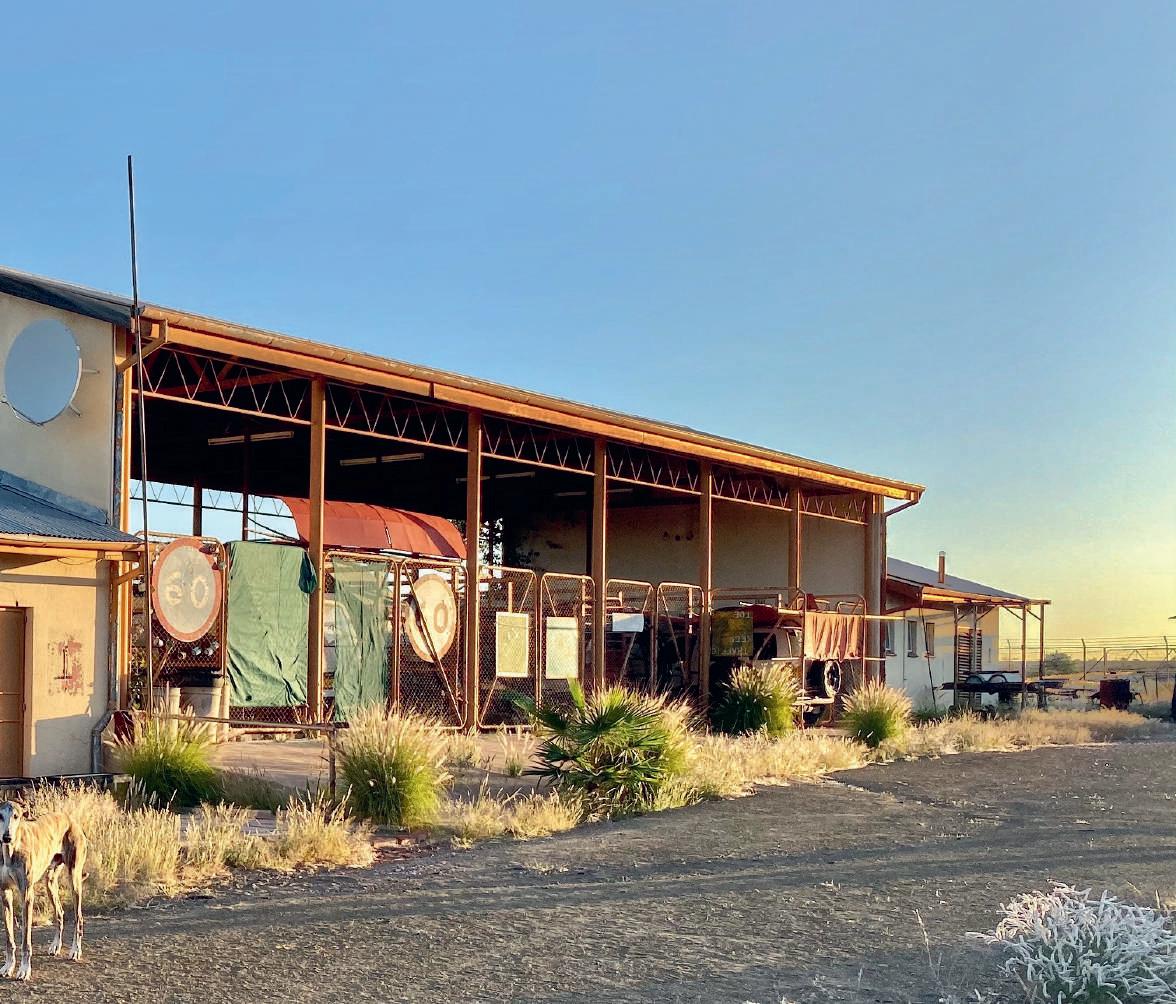
Recyclable solid waste from the lodges and farms in the Daweb Constituency will be collected weekly and transported to the Maltahöhe Recycling Facility with the DesertRunner. Here waste is sorted, compressed, crushed, repurposed and prepared for transport to recycling plants in South Africa. Permanent jobs are created. In addition, small enterprising waste pickers will be compensated for every load of recyclables picked from the streets in Maltahöhe and delivered at the facility. In no time, Maltahöhe will be one of the cleanest settlements in Namibia and inspire other villages to follow suit.
EconoMix
EconoMix serves as a transformative, entry-level business management program within RuralRevive, offering participants essential business skills to pursue their career aspirations and transform them into financially viable livelihoods. The program covers various aspects, including financial intelligence, costing, procurement, HR and admin, negotiation skills, and marketing. Through EconoMix, participants are equipped with the necessary tools to take charge of their own destiny and become empowered entrepreneurs. The program has already conducted a workshop engaging five women and two men in collaborative learning and discussions, providing them with startup capital and ongoing guidance to support their entrepreneurial journey. Participants are expected to present their business results by November 2023, fostering accountability and creating opportunities for reinvestment. Mentorship opportunities have also been identified to further support emerging entrepreneurs and encourage collaboration within the RuralRevive community.

Development
Enterprise
The driving force of RuralRevive
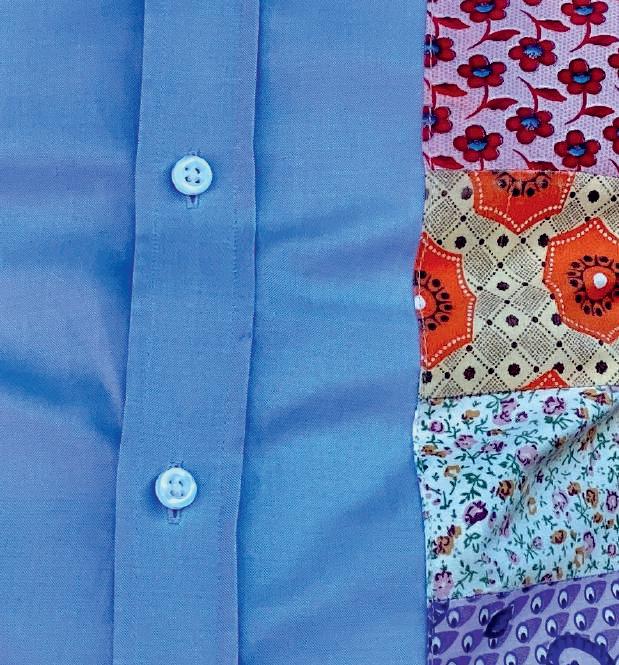
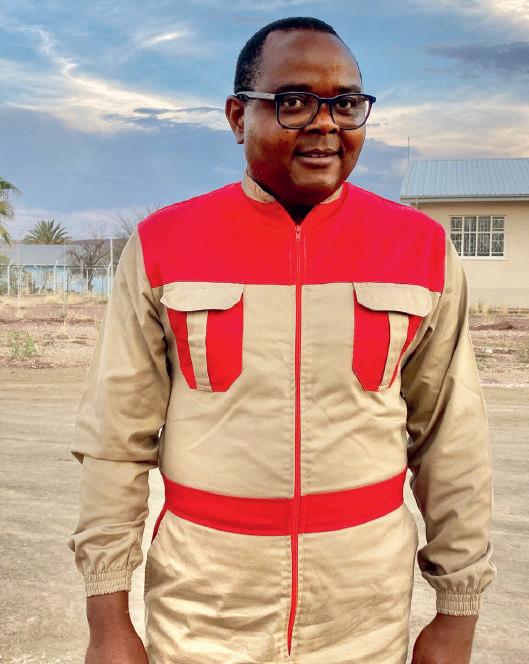
Future enterprise diversification and development opportunities will be explored as they arise. As RuralRevive takes hold and builds momentum, additional stakeholders will see merit in coming on board. New and complementary business ventures will naturally evolve in the region, ranging from diversified services and value-add production to manufacturing and retail. Eventually, the vision is for Maltahöhe to become a thriving business hub again, creating jobs and sustaining livelihoods.
Development
Identity & Values
The RuralRevive Initiative is:
• Rooted
• Connected
• Bold & Original
• Rewarding
• Organic
• Changing
• Empowering
• Inclusive
• Transparent
• Sustainable
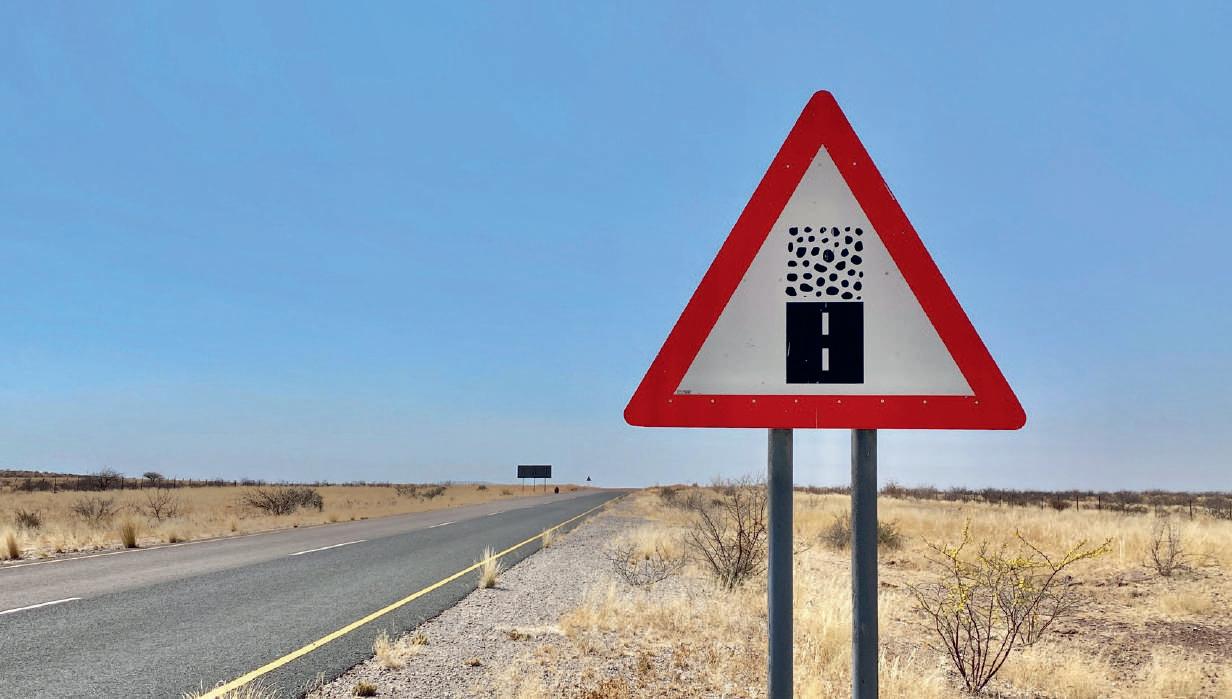
Crafting a unique RuralRevive identity was inspired by ten values which shape the vision for the future of this initiative and community. The logo takes its cue from a national road sign indicating a change of road surface, which occurs at Maltahöhe “where the tar road ends, and the gravel road begins”. It was a fitting point of departure for the development of a logo to symbolise a ‘change of status’. The prominent T-junction as you pass through Maltahöhe found its way into the logo
too, marking an analogy with the crossroads we face as humanity and the choices we must make to ensure that people and planet thrive in harmony. At the bottom of the crossroad is a straight line, indicating continuation with a ‘business as usual’ approach, whereas the top of the crossroads depicts a completely balanced and interconnected system. Additionally, this mimics the distinction between a linear vs. a circular economy, with the latter being a necessary paradigm shift.
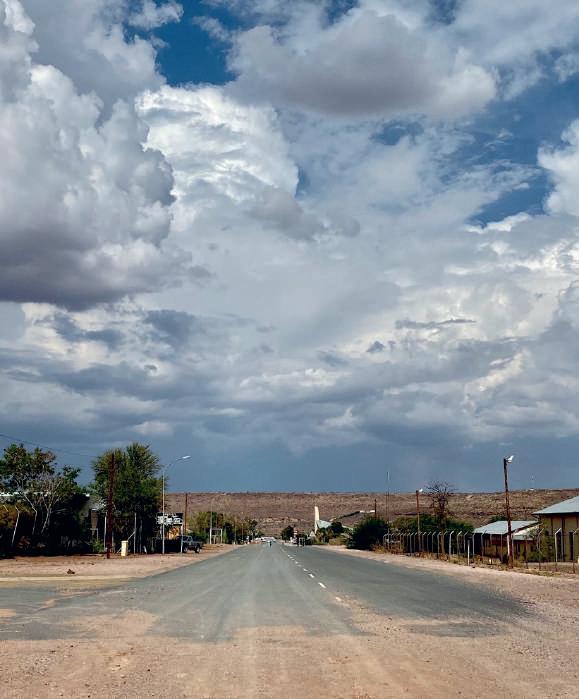
The nine dots represent the nine fields of RuralRevive:
• Enterprise Development – the driving force of RR
• Horticulture
• Transport & Logistics
• Waste Management & Recycling
• Resources (Energy & Water)
• Education & Skills Development
• Community well-being & Nutrition
• Culture & Heritage
• Media Ecology & Advocacy
The five coloured dots represent the Wolwedans 5C’s sustainability framework – Commerce | Conservation | Community | Culture | Consciousness.
Replicability
RuralRevive is intended as a concept blueprint for transparent and replicable economic revitalization of communities across the country and perhaps even the continent. This is achieved by identifying entry level opportunities that can serve as the foundation for future economic development, building capacity in relevant, key areas, and ensuring that there is a linkage with existing market demand.
RuralRevive wants to demonstrate that through simple and accessible activities, change can begin, lives improve, wealth inequality can be reduced, and improved well-being sustained.
Welcome on board…
... to building a more resilient, sustainable, inclusive and equitable tourism and conservation economy.
The Wolwedans Foundation, with the financial assistance of two key donors has got something special going - for the long run. Evidently, however - this mission can’t be tackled alone. More players – both drivers, facilitators and donors - need to come on board to make this holistic and potentially game-changing initiative work.
Many of the challenges faced, fall into the realm of public service and local government. It seems clear though, that the ‘authorities’ are overwhelmed by the apparent stumbling blocks, hence the private sector should accept responsibility and put shoulder to the wheel to ensue public interests like education, healthcare, resources, transport and waste management to name but a few.
Together, in the form of public-private-partnerships and through enterprise development, things can be swung around. The bold and long-term vision of RuralRevive heeds the advice from Abraham Lincoln’s famous quote: “Let’s determine that a thing can and shall be done, and then we will find a way.”
Now entering it’s third year, and with the hardware, basically in place, the time seems right to let RuralRevive become an entity unto its own. During 2024 RuralRevive will be registered as an independent Section 21 Company – an association not for gain. Whilst certain project workpackages like the laundry, waste management, Desert Runner transport solution and importantly “The Trading Hub” will be vested in this non-profit, acting as a conduit to make things happen or keep the wheels spinning, the platform will remain open and continue to invite more stakeholders and donors to run the course with us. There is certainly no lack of opportunity and need, to do what has to be done; for the benefit of people, and planet, with the inherent clear understanding that this is no quick fix, and a long journey lies ahead. “It always seems impossible until it’s done” Nelson Mandela famously said. So, what are we waiting for?
Going ahead, the envisioned RuralRevive 21 will manage projects within the nine fields in terms of needs analysis, project formulation, fundraising, management, accountability, administration and reporting simultaneously, giving potential donors who want to share their wealth in a meaningful way the surety that their funds will be put to good use and every dollar, accounted for.
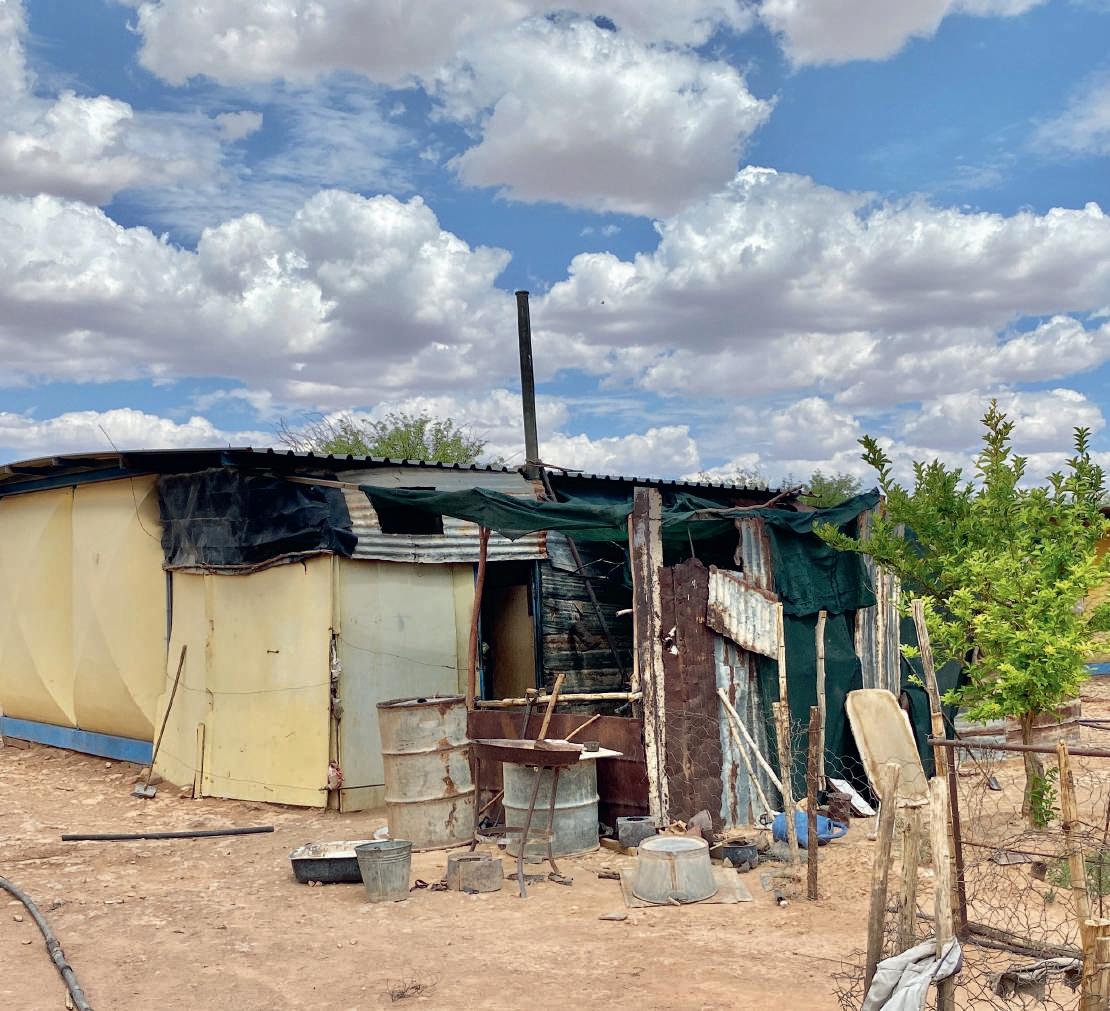
COULD THE INHABITANTS OF THIS ‘DWELLING’ BE BETTER OFF ONE DAY, THANKS TO RURALREVIVE?
RuralRevive – Building a Desert-Based Economy is conceptualized, driven and implemented by the Wolwedans Foundation and co-funded by the Namibian Social Security Commission Development Fund and the Wealth Inequality Initiative of the Julius Bäer Foundation. As of 2024 the Capricorn Foundation came on board and more corporate and institutional donors are welcome to engage on the platform.
Main areas of involvement through funding (2022 & 2023)
• Salary contribution - laundry, horticulture and security
• Solar system - 50% of equipment and installation
• Horticulture - Greenhouses, training, gardener
• Various other costs associated with project
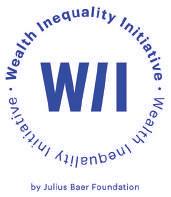


Main areas of involvement through funding (2021 ll end 2023)
• Renovation of project site infrastructure (hardware)
• The Laundry - washing machines and ironing room equipment
• Horticulture - Greenhouses and Food Processing facility (infrastructure)
• Salaries contribution: Contractors, laundry and horticulture during 2021 to 2023
• EconoMix programme (Phase 1)
• Various other costs associated with the project
Main areas of involvement through funding (as of 2024)
• Horticulture Training for small holding farmers
• Setting up five small holding farmers with produce purchase guarantee
• Getting recycling plant going (initial stages) and waste collection initiatives
• Customized App for The Barn Trading Post & EconoMix Programme
Main areas of involvement through funding (2020 to date)
• Includes the bulk of the work packages above and driving the process
• Securing suitable infrastructure needed to make the project work
SOCIAL SECURITY COMMISSION
Covid-19 proved how a pandemic accelerates all existing inequalities, including the ones of wealth and opportunities. It has become more urgent than ever to act and disrupt the wealth disparities for our societies to flourish. We are convinced that win-win-partnerships linking the underprivileged with the wealthy1 - target both the economic and the social dimension of the problem.
In so doing, such collaborations are valuable for all parties involved as they do not merely generate income, yet, rather foster relationships, opportunities and network.
The RuralRevive Initiative - an open system providing a platform for anybody to come on board – does just that; connecting donors, producers, service providers, small enterpreneurs, educators, health workers and politicians etc.
1) In the RuralRevive context ‘Wealth’ is the sprawling tourism industry in the south-western Namib desert, Namibian Big Business, NGO’s and wealth outside Namibia.
WWW.RURALREVIVE.ORG















 Left top: The drying shed ready to receive linen, mainly comprising bulky bedding and towels.
Above: the ironing room has twelve workstations.
Left top: The drying shed ready to receive linen, mainly comprising bulky bedding and towels.
Above: the ironing room has twelve workstations.


























 Left top: Lots of trash. A common sight in Maltahöhe
Bottom: This resource is just dumped in the landfil area
Right: Assessing the dump site and looking for solutions to a major rural and global challenge
Left top: Lots of trash. A common sight in Maltahöhe
Bottom: This resource is just dumped in the landfil area
Right: Assessing the dump site and looking for solutions to a major rural and global challenge











